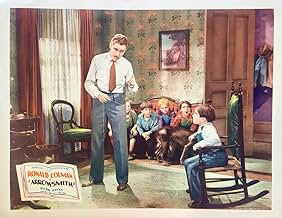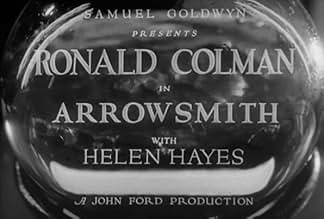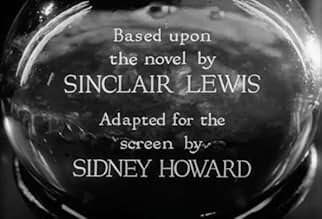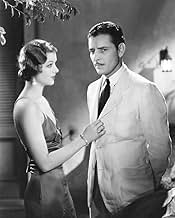IMDb RATING
6.2/10
2.1K
YOUR RATING
A medical researcher is sent to a plague outbreak, where he has to decide priorities for the use of a vaccine.A medical researcher is sent to a plague outbreak, where he has to decide priorities for the use of a vaccine.A medical researcher is sent to a plague outbreak, where he has to decide priorities for the use of a vaccine.
- Nominated for 4 Oscars
- 4 wins & 4 nominations total
Alec B. Francis
- Twyford
- (as Alec Francis)
Erville Alderson
- Pioneer
- (uncredited)
Beulah Bondi
- Mrs. Tozer
- (uncredited)
Florence Britton
- Miss Twyford
- (uncredited)
Josephine Brown
- West Indies Village Bride
- (uncredited)
Nora Cecil
- Nurse
- (uncredited)
- Director
- Writers
- All cast & crew
- Production, box office & more at IMDbPro
Featured reviews
Based off the Lewis Sinclair epic, Arrowsmith follows a young doctor's journey as he explores different avenues of medicine and research. As you might expect, from page-to-screen, a little ends up on the cutting room floor. Still, if you like medical movies, you'll probably want to give this classic a try. It reminded me of a cross between The Citadel and The Doctor and the Girl.
As I've frequently said, there are two sides to Ronald Colman, and Arrowsmith contains the version with a stick perpetually lodged somewhere uncomfortable. He's not as passionate as he is in other movies, so keep that in mind. For a better first impression of him, try A Tale of Two Cities. You'll get a fine first impression of Helen Hayes, though, who plays his long-suffering wife. She's young and pretty in this one, a far cry from her Miss Marple little-old-lady persona of later decades. She has more passion than her husband, and she repeatedly pushes him to pursue his medical interest, even at the expense of their personal life. She never wants to be left behind, and she follows him all around the world as he conducts research for the bubonic plague.
You'll see Myrna Loy for about five minutes, but it's not her movie, so don't expect anything other than a pretty face. Colman and Hayes have pretty faces, too, and it is always fun to see a very old movie, but it's not my favorite. I like The Doctor and the Girl better, so if you find this movie lacking, you might want to check out Glenn Ford's take on it.
As I've frequently said, there are two sides to Ronald Colman, and Arrowsmith contains the version with a stick perpetually lodged somewhere uncomfortable. He's not as passionate as he is in other movies, so keep that in mind. For a better first impression of him, try A Tale of Two Cities. You'll get a fine first impression of Helen Hayes, though, who plays his long-suffering wife. She's young and pretty in this one, a far cry from her Miss Marple little-old-lady persona of later decades. She has more passion than her husband, and she repeatedly pushes him to pursue his medical interest, even at the expense of their personal life. She never wants to be left behind, and she follows him all around the world as he conducts research for the bubonic plague.
You'll see Myrna Loy for about five minutes, but it's not her movie, so don't expect anything other than a pretty face. Colman and Hayes have pretty faces, too, and it is always fun to see a very old movie, but it's not my favorite. I like The Doctor and the Girl better, so if you find this movie lacking, you might want to check out Glenn Ford's take on it.
Goldwyn put together a lot of fine talent here, but none of it jells.
Ronald Colman, Laurence Olivier's idol and one of the screen's most likable actors, is just plain miscast. Helen Hayes projects annoyingly to the audience, stage fashion, rather than letting the camera discover her emotions, as even the young Myrna Loy knows how to do. Richard Bennett is enjoyably over-the-top as Sondelius but A. E. Anson's accent is a deal-breaker as Gottlieb (as if there weren't enough real Middle European actors in Hollywood at the time).
Sydney Howard's script is condensed to the point of silliness - the other reviewers here who contrast "Gone With the Wind" as a model of condensation are praising an uncredited Ben Hecht, not Sydney Howard. Ray June's fluid cinematography is beautiful throughout, with more than one shot that would wind up re-used in Ford's "The Searchers" many years later.
The story is that Goldwyn hired a bibulous Ford on condition that the director couldn't take one drink during production. Helen Hayes noticed that as the shoot progressed, Ford started discarding pages and then whole scenes, in a race to finish the film and get back to his booze. That may be one more reason that the film is barely coherent.
Hey, nobody's perfect all the time.
Ronald Colman, Laurence Olivier's idol and one of the screen's most likable actors, is just plain miscast. Helen Hayes projects annoyingly to the audience, stage fashion, rather than letting the camera discover her emotions, as even the young Myrna Loy knows how to do. Richard Bennett is enjoyably over-the-top as Sondelius but A. E. Anson's accent is a deal-breaker as Gottlieb (as if there weren't enough real Middle European actors in Hollywood at the time).
Sydney Howard's script is condensed to the point of silliness - the other reviewers here who contrast "Gone With the Wind" as a model of condensation are praising an uncredited Ben Hecht, not Sydney Howard. Ray June's fluid cinematography is beautiful throughout, with more than one shot that would wind up re-used in Ford's "The Searchers" many years later.
The story is that Goldwyn hired a bibulous Ford on condition that the director couldn't take one drink during production. Helen Hayes noticed that as the shoot progressed, Ford started discarding pages and then whole scenes, in a race to finish the film and get back to his booze. That may be one more reason that the film is barely coherent.
Hey, nobody's perfect all the time.
The student of medical school Martin Arrowsmith (Ronald Colman) dreams on becoming a researcher. He seeks out Professor Max Gottlieb (A.E. Anson) that promises the position when Arrowsmith is an undergraduate doctor. Meanwhile Arrowsmith meets the nurse Leora (Helen Hayes) and they fall in love with each other. When Prof. Gottlieb invites Arrowsmith to work with him in New York, he declines since the salary is not enough to support Leora and him. He marries Leora and becomes a countryside doctor. After a while, the frustrated Arrowsmith decides to move with Leora to New York to work with Gottlieb. Soon he is invited to go to a Caribbean Island where there is an outbreak of bubonic plague to test a serum he has developed in the population and Leora decides to go with him despite the danger. Will Arrowsmith succeed in saving the inhabitants?
"Arrowsmith" is a deceptive film directed by John Ford. The story seems to be incomplete missing explanation, for example, about Mrs. Joyce Lanyon, performed by the gorgeous Myrna Loy. The relationship between Arrowsmith and his wife is also underdeveloped. Ronald Colman is too old for the role of a young idealistic doctor. Maybe the viewer that has read the novel may like this film more than one that has never read it. Last but not the least, the Brazilian title is awful. My vote is five.
Title (Brazil): "Médico e Amante" ("Doctor and Lover")
"Arrowsmith" is a deceptive film directed by John Ford. The story seems to be incomplete missing explanation, for example, about Mrs. Joyce Lanyon, performed by the gorgeous Myrna Loy. The relationship between Arrowsmith and his wife is also underdeveloped. Ronald Colman is too old for the role of a young idealistic doctor. Maybe the viewer that has read the novel may like this film more than one that has never read it. Last but not the least, the Brazilian title is awful. My vote is five.
Title (Brazil): "Médico e Amante" ("Doctor and Lover")
The fact that an idealistic medical doctor was the protagonist in Arrowsmith is the reason why John Ford must have been attracted to this story and agreed to film it for Sam Goldwyn.
Allegedly it was not a happy collaboration. Two very individualistic men wanted to have their imprimatur on the film. They never worked together on a finished product again, though Ford did start filming The Adventures of Marco Polo for Goldwyn and quit.
I read the novel way back in the day when I was in high school and we only get the second half of it. There's a great deal in the book before Ronald Colman as Martin Arrowsmith goes to work for the Research Foundation and A.E. Anson as Max Gottlieb. You miss quite a lot of the character development of Arrowsmith.
Of course the plot mostly centers on Colman and his other mentor, Richard Bennett going to a Caribbean Island where there has been an outbreak of plague. Along for the trip is Helen Hayes who is Colman's wife Leora.
Colman is there to test a new serum and he's under orders as a researcher to only administer the real stuff to half his patient and a placebo to the others as a control group. This is where the racism of the time kicks in as these human guinea pigs are black, probably the descendants of runaway slaves. There is a black doctor named Marchand in the cast played by Oliver Brooks and it is a rarity among black performers at the time in that the role was hardly servile at all. Brooks seems to go along with the controlled experiment, but he becomes one of many in the cast to meet a tragic end.
With some of what came out about the Tuskegee experiments later on Arrowsmith may have been quite on target without knowing it. A harrowing thought.
Colman and Hayes are an attractive pair of leads. Myrna Loy has a much abbreviated role in the film as a New York socialite that Colman meets down in the islands. In the book he has an affair with her and marries her later on. You won't see that here.
Arrowsmith is a good film though I wish more of Lewis's story got into the final product. But it probably would have run for three hours and films just didn't do that back then.
Allegedly it was not a happy collaboration. Two very individualistic men wanted to have their imprimatur on the film. They never worked together on a finished product again, though Ford did start filming The Adventures of Marco Polo for Goldwyn and quit.
I read the novel way back in the day when I was in high school and we only get the second half of it. There's a great deal in the book before Ronald Colman as Martin Arrowsmith goes to work for the Research Foundation and A.E. Anson as Max Gottlieb. You miss quite a lot of the character development of Arrowsmith.
Of course the plot mostly centers on Colman and his other mentor, Richard Bennett going to a Caribbean Island where there has been an outbreak of plague. Along for the trip is Helen Hayes who is Colman's wife Leora.
Colman is there to test a new serum and he's under orders as a researcher to only administer the real stuff to half his patient and a placebo to the others as a control group. This is where the racism of the time kicks in as these human guinea pigs are black, probably the descendants of runaway slaves. There is a black doctor named Marchand in the cast played by Oliver Brooks and it is a rarity among black performers at the time in that the role was hardly servile at all. Brooks seems to go along with the controlled experiment, but he becomes one of many in the cast to meet a tragic end.
With some of what came out about the Tuskegee experiments later on Arrowsmith may have been quite on target without knowing it. A harrowing thought.
Colman and Hayes are an attractive pair of leads. Myrna Loy has a much abbreviated role in the film as a New York socialite that Colman meets down in the islands. In the book he has an affair with her and marries her later on. You won't see that here.
Arrowsmith is a good film though I wish more of Lewis's story got into the final product. But it probably would have run for three hours and films just didn't do that back then.
On paper, 'Arrowsmith' sounded like it had potential to be a great film. Great source material courtesy of Sinclair Lewis. A fine director in John Ford, though he was early on in his career at this point, who went on to direct some of cinema's finest westerns. That it was a box office hit in the day. And a gifted cast in Ronald Colman, Helen Hayes and pre-stardom Myrna Loy. Did have a couple of reservations though, as the length did sound far too short for such a big and meaty book and the reviews here were very mixed.
Can totally understand the mixed critical reception here and am very mixed in 'Arrowsmith' myself. It is not a terrible film as there are good things, but there are just too many things wrong with it to consider it a good film. There are books that would either leant themselves much better to a mini-series or should have been left alone and 'Arrowsmith' is a case of both instances. In honesty though, one doesn't really to have read the book to see how heavily flawed it is. As far as Ford's films go this is a lesser effort.
'Arrowsmith' does benefit from some good things. Will agree that in some ways that Colman is miscast, but he does bring freshness and sincerity to the lead role. Hayes is noble and poignant and Loy is suitably vivacious in a rather underwritten role. The relationship between Arrowsmith and Joyce was quite bold back then and has spark. Richard Bennett is also very good in his role.
The production values are quite good too, especially the photography. Dark, vivid and atmospheric, plus Hayes and especially Loy look fantastic in their shots. The settings are handsome and evocative. The music score sweeps without being intrusive.
However, the film just feels far too rushed and choppy, which a couple of my friends who had not read the source material also felt. The heavily condensed story is very rushed in pace and with such a lot glossed over there is a sense of incompleteness which gives off a choppy feel structurally and a lack of coherence. The characters are underwritten, especially Joyce, and their motivations vague at best.
Furthermore, the script is very Cliff notes, a case of introducing one event and character and then moving onto the next without development. It is also very stilted. Ford went on to be a fine director, but here he didn't seem to know what to do with the material or seem right for it, too routine and lightweight while at other times too heavy. Do agree that although Colman does give his all, he was too old and artistocratic.
In summary, watchable but really doesn't live up to its potential. 5/10
Can totally understand the mixed critical reception here and am very mixed in 'Arrowsmith' myself. It is not a terrible film as there are good things, but there are just too many things wrong with it to consider it a good film. There are books that would either leant themselves much better to a mini-series or should have been left alone and 'Arrowsmith' is a case of both instances. In honesty though, one doesn't really to have read the book to see how heavily flawed it is. As far as Ford's films go this is a lesser effort.
'Arrowsmith' does benefit from some good things. Will agree that in some ways that Colman is miscast, but he does bring freshness and sincerity to the lead role. Hayes is noble and poignant and Loy is suitably vivacious in a rather underwritten role. The relationship between Arrowsmith and Joyce was quite bold back then and has spark. Richard Bennett is also very good in his role.
The production values are quite good too, especially the photography. Dark, vivid and atmospheric, plus Hayes and especially Loy look fantastic in their shots. The settings are handsome and evocative. The music score sweeps without being intrusive.
However, the film just feels far too rushed and choppy, which a couple of my friends who had not read the source material also felt. The heavily condensed story is very rushed in pace and with such a lot glossed over there is a sense of incompleteness which gives off a choppy feel structurally and a lack of coherence. The characters are underwritten, especially Joyce, and their motivations vague at best.
Furthermore, the script is very Cliff notes, a case of introducing one event and character and then moving onto the next without development. It is also very stilted. Ford went on to be a fine director, but here he didn't seem to know what to do with the material or seem right for it, too routine and lightweight while at other times too heavy. Do agree that although Colman does give his all, he was too old and artistocratic.
In summary, watchable but really doesn't live up to its potential. 5/10
Did you know
- TriviaCensorship at the time meant that the subplot of Arrowsmith's liaison with another woman while still married meant that most of Myrna Loy's scenes were drastically cut. Although every attempt was made to restore the present version to its original length, there are still about 10 minutes missing.
- GoofsArrowsmith conducts a trial of his serum by giving it to half the potential plague victims and giving the other half nothing. Anyone who tried this in real life would provoke protests, if not riots. So these trials are conducted by giving half the people a placebo and not telling anyone which they are getting.
- Quotes
Dr. Martin Arrowsmith: God give me clear eyes and freedom from haste. God give me anger against all pretense. God keep me looking for my own mistakes. God keep me at it till my results are proven. God give me strength not to trust to God.
- Crazy creditsOpening credits prologue: The story of a man who dedicated his life to service and his heart to the love of one woman.
- Alternate versionsMyrna Loy's role was substantially reduced when the film was reissued because the Production Code had taken effect. The missing scenes have been restored on the DVD.
- ConnectionsReferenced in Citizen Kane (1941)
- SoundtracksWilliam Tell Overture
(1829) (uncredited)
Written by Gioachino Rossini
Played on piano from a recording
- How long is Arrowsmith?Powered by Alexa
Details
- Release date
- Country of origin
- Languages
- Also known as
- El doctor Arrowsmith
- Filming locations
- Production companies
- See more company credits at IMDbPro
- Runtime
- 1h 48m(108 min)
- Color
- Aspect ratio
- 1.20 : 1
Contribute to this page
Suggest an edit or add missing content




































